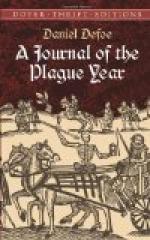Doubtless, the physicians assisted many by their skill, and by their prudence and applications, to the saving of their lives and restoring their health. But it is not lessening their character or their skill, to say they could not cure those that had the tokens upon them, or those who were mortally infected before the physicians were sent for, as was frequently the case.
It remains to mention now what public measures were taken by the magistrates for the general safety, and to prevent the spreading of the distemper, when it first broke out. I shall have frequent occasion to speak of the prudence of the magistrates, their charity, their vigilance for the poor, and for preserving good order, furnishing provisions, and the like, when the plague was increased, as it afterwards was. But I am now upon the order and regulations they published for the government of infected families.
I mentioned above shutting of houses up; and it is needful to say something particularly to that, for this part of the history of the plague is very melancholy, but the most grievous story must be told.
About June the Lord Mayor of London and the Court of Aldermen, as I have said, began more particularly to concern themselves for the regulation of the city.
The justices of Peace for Middlesex, by direction of the Secretary of State, had begun to shut up houses in the parishes of St Giles-in-the-Fields, St Martin, St Clement Danes, &c., and it was with good success; for in several streets where the plague broke out, upon strict guarding the houses that were infected, and taking care to bury those that died immediately after they were known to be dead, the plague ceased in those streets. It was also observed that the plague decreased sooner in those parishes after they had been visited to the full than it did in the parishes of Bishopsgate, Shoreditch, Aldgate, Whitechappel, Stepney, and others; the early care taken in that manner being a great means to the putting a check to it.
This shutting up of houses was a method first taken, as I understand, in the plague which happened in 1603, at the coming of King James the First to the crown; and the power of shutting people up in their own houses was granted by Act of Parliament, entitled, ’An Act for the charitable Relief and Ordering of Persons infected with the Plague’; on which Act of Parliament the Lord Mayor and aldermen of the city of London founded the order they made at this time, and which took place the 1st of July 1665, when the numbers infected within the city were but few, the last bill for the ninety-two parishes being but four; and some houses having been shut up in the city, and some people being removed to the pest-house beyond Bunhill Fields, in the way to Islington,—I say, by these means, when there died near one thousand a week in the whole, the number in the city was but twenty-eight, and the city was preserved more healthy in proportion than any other place all the time of the infection.




